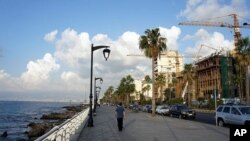Pessimists have not been disappointed by Lebanon's recent history. In the past few decades, it has suffered civil war, domination by Syria, occupation by Israel, assassinations, civil unrest, and just last month a border incident that brought worries of a new Israeli conflict. Yet for all the instability, there is an optimism apparent on the avenues of Beirut, awash in luxury boutiques and in a skyline studded with high-end apartment buildings and five-star hotels. There is an unlikely economic boom in the Lebanese capital.
The resilience can be seen in a painting propped up in the sleek Beirut office of real estate advisor Raja Makarem. The stylized, black and white work shows the facade of an old building downtown; intricate, elegant and riddled with bullet holes.
It is not that Makarem needs a reminder of Lebanon's violent past. "A couple of weeks ago I was offering a project to a friend of mine, quite a big project that is a $100 million, and I said, 'Aren't you scared?'" the director of the real estate firm Ramco recalled. "And he said, 'No matter what happens, Lebanon is going to be the same, so I am not worried.' We are used to it. It can't be worse than what we had."
Lebanon succeeds while others struggle
Other countries have suffered similar hardships and their people have shown resilience, but few have been able to rise above instability quite the way Lebanon appears to have done. Makarem argued that a quirk of Lebanon's story is that some of its success is rooted in its troubles.
He said that because of the instability, because of the problems, because of so many things, people, mainly developers, have been depending on financing themselves, auto-financing. The land they buy is with 100 percent cash, and instead of borrowing money from the bank for development, they do pre-sale. The real estate advisor said that when the international crisis hit, none of the developers had debts to the bank, and the country rode out the global recession.
Favorable banking and property laws
Lebanon's strong property laws also have played a role in boosting investor confidence. Despite the chaos, the laws remained largely intact through the decades, so that even after the civil war, landowners were able to reclaim their rightful property.
Such traditional views also have helped keep the banking system strong. Paul Salem, director of the Carnegie Middle East Center in Beirut said that "what also makes Lebanon attractive is the banking system, which maintains banking secrecy, which is almost unique now in the world, and hence as well as at a time when interest rates in Lebanon are fairly high, for deposits here." He added that both Lebanese and Gulf capital investors also have a strong sense that the banks in Lebanon are in close cooperation, in close communication."
Salem said that cooperation extends to the banks keeping the government afloat, through financing debt and buying treasury bonds. The government, in turn, guarantees the safety and solvency of the banks. The political analyst said the inherent security of the arrangement attracts Arab investors from the Gulf, some of them shaken with the spectacular flame-outs of economies, such as Dubai's.
Instability is tempered by beautiful beaches
Lebanon also appeals to the same clientele for its more hospitable climate, mountains for skiing, Mediterranean beaches and a cosmopolitan air that is a product of its multi-religious, well-traveled citizens.
Real estate advisor Makarem said the same factors have brought investment from some of the millions in the Lebanese diaspora around the world.
Not that events do not continue to rattle.
Makarem said that "every time there is something serious happening, whether confrontation with Israel or local confrontation or whatever, people get scared a little bit and they calm down a little bit. But the minute something positive happens ... you know, they got used to it. There is a great confidence in the long-term future of the country."
As long as Lebanon maintains the systems it has kept in place during the upheavals, Makarem predicts that the investors will continue to come.




